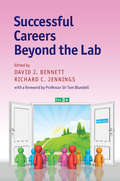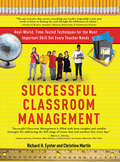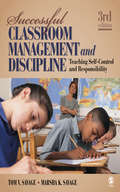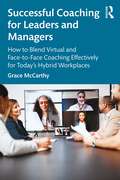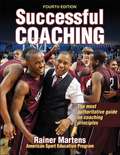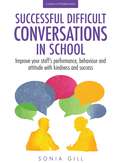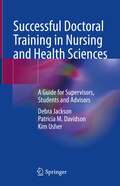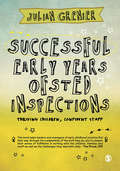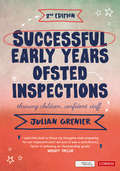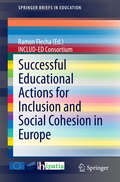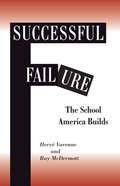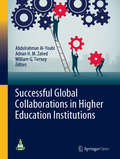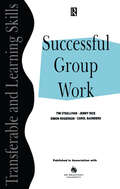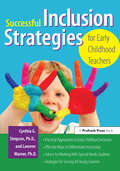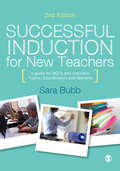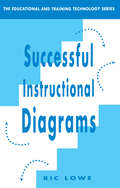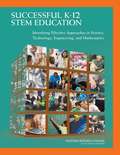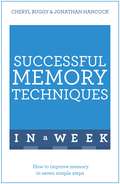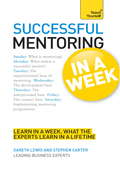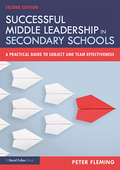- Table View
- List View
Successful Careers beyond the Lab
by Richard C. David J. Bennett JenningsThere is a major demand for people with scientific training in a wide range of professions based on and maintaining relations with science. However, there is a lack of good first-hand information about alternative career paths to research. From entrepreneurship, industry and the media to government, public relations, activism and teaching, this is a readable guide to science based skills, lifestyles and career paths. The ever-narrowing pyramid of opportunities within an academic career structure, or the prospect of a life in the laboratory losing its attraction, mean that many who trained in science and engineering now look for alternative careers. Thirty role models who began by studying many different disciplines give personal guidance for graduates, postgraduates and early-career scientists in the life sciences, physical sciences and engineering. This book is an entertaining resource for ideas about, and directions into, the many fields which they may not be aware of or may not have considered.
Successful Classroom Management
by Richard H. Eyster Christine MartinEach year, tens of thousands of new teachers head out for their first teaching job, ready to fulfill a lifetime dream. However, most teachers have nothing to prepare them for or support them on one of the most important parts of their job: how to effectively run a classroom and handle the students. Successful Classroom Management is the first book to give you the skills you need to manage a classroom effectively. Richard H. Eyster and Christine Martin present the lessons that have made them the most sought-after seminar trainers on the topic, addressing: Handling Classroom Problems Troubleshooting Issues Enforcing Discipline Inspiring Students Creating an Engaging Classroom Atmosphere Filled with expert advice, stories and tips from teachers, and spot-on techniques, this is your new essential handbook that will help you not only survive in the classroom, but also live your dream and give your students the full gifts that come from a great education.
Successful Classroom Management and Discipline: Teaching Self-Control and Responsibility
by Tom V. Savage Dr Marsha K. SavageFocusing on how educators can facilitate the development of self-control and responsibility in students, Successful Classroom Management and Discipline offers comprehensive yet concise coverage of the preventative aspects of classroom management, as well as a wide range of effective intervention strategies. In this Third Edition, authors Tom Savage and Martha K. Savage offer new and updated coverage of teacher stress, legal dimensions of management and discipline, teacher/family collaboration, and bullying. Key FeaturesFeatures a two-part structure to pinpoint the key dimensions of classroom management: how to prevent classroom issues and how to respond to problems that arise Identifies a measurable goal for K–12 teachers: helping students to develop self-control and responsibility Addresses "teacher burnout" through practical application of stress management Describes bullying behaviors and teacher response, including a section on working with parents, a vital skill for avoiding and resolving serious problems Presents realistic case studies and "What Would You Do?" scenarios to demonstrate chapter concepts
Successful Coaching for Leaders and Managers: How to Blend Virtual and Face-to-Face Coaching Effectively for Today's Hybrid Workplaces
by Grace McCarthyThe rapid pace of change in the post-COVID world has made it more important than ever for managers to coach individual employees and teams effectively both online and face to face. This book draws on research from around the world and shares good practices to help managers become effective leaders in face-to-face, virtual, and hybrid workplaces.The book examines how the coaching skills of observation, listening, questioning, goal-setting, feedback, and reflection can be used effectively with individuals and teams. Boxes offering scenarios and practical activities help the reader understand how to apply these skills in real life. The book goes on to explore coaching at the organisational level, bringing in systems thinking, coaching culture, cross-cultural coaching, and coaching in multi-national organisations. Finally, the book considers ways for managers to evaluate and improve their coaching, including how to use technology and GenAI to support coaching.This book synthesises different strands of research to help managers develop their coaching skills both face to face and online. HR managers will find ideas for how best to support managers in developing their skills. Researchers and educators interested in managerial coaching and successful leadership in the post-COVID hybrid workplace will also find food for thought.
Successful Coaching, Fourth Edition
by Rainer MartensThis comprehensive text includes content on how to communicate and motivate players, as well as manage problem behaviours among athletes with a positive approach. It provides a full introduction to the games approach to coaching and strategic advice on how to incorporate this into a successful programme. Successful Coaching is the text for the American Sport Education Program's (ASEP) Coaching Principles course and is widely used as a text in college introductory coaching courses.
Successful Difficult Conversations: Improve your team's performance, behaviour and attitude with kindness and success
by Sonia GillWhether you are a Head or Deputy Head, a Head of Department or Year 3 Teacher, this book is an invaluable read. It is full of practical ways to help you, when facing one of `those' conversations with a colleague or parent, you know in your heart you need to have, but would rather avoid having, because you don't really know what to say or how to say it.
Successful Difficult Conversations: Improve your team's performance, behaviour and attitude with kindness and success
by Sonia GillWhether you are a Head or Deputy Head, a Head of Department or Year 3 Teacher, this book is an invaluable read. It is full of practical ways to help you, when facing one of `those' conversations with a colleague or parent, you know in your heart you need to have, but would rather avoid having, because you don't really know what to say or how to say it.
Successful Doctoral Training in Nursing and Health Sciences: A Guide for Supervisors, Students and Advisors
by Debra Jackson Kim Usher Patricia M. DavidsonThis textbook is a practical, user-friendly and essential guide for doctoral students, their supervisors and advisors and administrators of doctoral programs in nursing and health sciences. Nurses and health scientists have a relatively young tradition of doctoral training, and this means students often come to doctoral studies without a clear understanding of what is required to be successful at this level of education. Supporting students to successful completion of doctoral studies involves a complex fusion of skills, and yet researchers and academics receive little specialist training in this crucial area of teaching and learning. Strong pedagogies around doctoral supervision and writing are essential because in addition to the scientific, research and educative skills required, it is important to be able to establish and maintain enabling professional relationships within which both parties can thrive, and that can withstand the years of critique needed for doctoral work. The authors offer supervisors, advisors, students and administrators practical advice on helping students thrive, and steering them through various challenges that can arise during doctoral candidature. With a focus on nursing and health sciences, the authors take a global approach, recognising the international focus of doctoral training in nursing and health sciences. The authors of this book are experienced supervisors and advisors to doctoral students and together, have well over 100 successful doctoral completions and more than 1000 publications. They draw on a series of interviews and case studies to share their knowledge and experience and provide insights and guidance to inspire and support student progression and ensure students get the most out of their doctoral studies.
Successful Early Years Ofsted Inspections: Thriving Children, Confident Staff
by Mr Julian GrenierThe stakes have never been higher: Ofsted have a new, tougher inspection framework for the early years. If you are judged to be less than good, you risk losing funding for places. A reputation that took years to build can vanish overnight. But instead of hiding behind the "Ofsted monster" to get things done, Early Years expert Julian Grenier argues that it's time to do what's right for children and families, and build long-lasting and effective provision. Completely up to date with Ofsted's new Common Inspection Framework and avoiding a 'tick-box' approach to preparation, Julian focuses on the importance of developing your provision and your team up to and beyond inspection day. It is accompanied by easy-to-use time-saving pro formas and self-reflective documents that can be downloaded online for free. This book is ideal for head teachers, senior leaders, EYFS co-ordinators, nursery managers and Early Years practitioners.
Successful Early Years Ofsted Inspections: Thriving Children, Confident Staff
by Mr Julian GrenierShortlisted for Best Professional Book by Nursery World Awards 2017! The stakes have never been higher: Ofsted have a new, tougher inspection framework for the early years. If you are judged to be less than good, you risk losing funding for places. A reputation that took years to build can vanish overnight. But instead of hiding behind the “Ofsted monster” to get things done, Early Years expert Julian Grenier argues that it’s time to do what’s right for children and families, and build long-lasting and effective provision. Completely up to date with Ofsted’s new Common Inspection Framework and avoiding a ‘tick-box’ approach to preparation, Julian focuses on the importance of developing your provision and your team up to and beyond inspection day. It is accompanied by easy-to-use time-saving pro formas and self-reflective documents that can be downloaded online for free. This book is ideal for head teachers, senior leaders, EYFS co-ordinators, nursery managers and Early Years practitioners. “We had our Ofsted Inspection on May 31st and achieved an Outstanding grade which we are very proud of, as you might imagine! I used Successful Early Years Ofsted Inspections to focus my thoughts when preparing for the inspection and I am sure it was a contributory factor in our grade.” -Wendy Taylor, Nursery Manager, Acorns Nursery Julian Grenier will be discussing ideas from Successful Early Years Oftsed Inspections in the SAGE Early Years Masterclass, a free professional development experience hosted by Kathy Brodie. To sign up, or for more information, click here.
Successful Early Years Ofsted Inspections: Thriving Children, Confident Staff (Corwin Ltd)
by Mr. Julian GrenierThe thought of a looming Ofsted inspection can send even the most positive practitioner into a panic. Julian Grenier leads you through the new updated Ofsted framework, and shows you how to navigate the process. He focuses on doing what is best for children and families to build long-lasting and effective provision that can be maintained before, during and after inspection. This new edition includes: • More downloadable templates and resources • Detailed coverage of the curriculum, and the new &‘Quality of education&’ judgement • Guidance on working with parents and carers to ensure their voices are part of the Ofsted inspection process This book is ideal for Headteachers, EYFS co-ordinators, Nursery Managers and Early Years practitioners.
Successful Early Years Ofsted Inspections: Thriving Children, Confident Staff (Corwin Ltd)
by Mr. Julian GrenierThe thought of a looming Ofsted inspection can send even the most positive practitioner into a panic. Julian Grenier leads you through the new updated Ofsted framework, and shows you how to navigate the process. He focuses on doing what is best for children and families to build long-lasting and effective provision that can be maintained before, during and after inspection. This new edition includes: • More downloadable templates and resources • Detailed coverage of the curriculum, and the new &‘Quality of education&’ judgement • Guidance on working with parents and carers to ensure their voices are part of the Ofsted inspection process This book is ideal for Headteachers, EYFS co-ordinators, Nursery Managers and Early Years practitioners.
Successful Educational Actions for Inclusion and Social Cohesion in Europe
by Ramon FlechaThis monograph analyses and describes successful educational actions with a specific focus on vulnerable groups (i. e. youth, migrants, cultural groups e. g. Roma, women, and people with disabilities). Concrete data that shows success in school performance in subject matters such as math or language will be provided, as well as children, teachers and families accounts of the impact of this success. Alongside, there is an analysis of the relationship between these children's educational performance with their inclusion or exclusion from different areas of society (i. e. housing, health, employment, and social and political participation). Many studies have already diagnosed and described the causes of educational and social exclusion of these vulnerable groups. This monograph, however, provides solutions, that is, actions for success identified through the INCLUD-ED project, thus providing both, contrasted data and solid theoretical background and development. Some examples of these actions are interactive groups (or heterogeneous grouping in the classroom with reorganisation of human resources), extension of the learning time, homework clubs, tutored libraries, family and community educative participation, family education, or dialogic literary gatherings. All these actions have been defined as successful educational actions, which mean that they lead to both efficiency and equity. Finally, recommendations for policy and practice are included and discussed.
Successful Failure: The School America Builds
by Herve VarenneIn this controversial work, Herv Varenne and Ray McDermott explore education as cultural phenomenona construct of artifice and reality we impose upon ourselves. Questioning how the American education system defines and measures success and failure, Successful Failure is a must-read for anyone interested in educational reform, the American educational system, and the anthropology of education. }In this controversial work, Herv Varenne and Ray McDermott explore education as cultural phenomenona construct of artifice and reality we impose upon ourselves. The authors discuss in five case studies how the American education system defines and measures success and failure, why there is polarization between suburban schools and urban schools, and what about our system leads us to focus on the negative. Their exploration focuses not on the people or the activities of the system, but on the institutions themselves: who decided what was a success or failure? How was the identification done, and with what consequences?This important and timely book is a must-read for anyone interested in educational reform, the American educational system, and the anthropology of education.
Successful Global Collaborations in Higher Education Institutions
by William G. Tierney Abdulrahman Ai-Youbi Adnan H. M. ZahedThis open access book written by international experts in the field of educational innovation is a guide for universities to become world-class universities. It contributes to the current international intellectual debate on the future of higher education. It also tells the story of King Abdulaziz University in Jeddah (Saudi Arabia) and its effort to become a world-class university. The book discusses excellence in different aspects such as education, research, community services, strategic planning, knowledge economy and international cooperation.
Successful Group Work: A Practical Guide for Students in Further and Higher Education
by Carol Saunders Tim O'Sullivan Jenny Rice Simon RogersonThis concise guide covers all the practical skills that students need to work effectively in a group in higher and further education. Using a variety of interactive teaming activities, students can practice the main principles. A number of case-study and real-life examples are also included.
Successful Inclusion Strategies for Early Childhood Teachers
by Vicky G. Spencer Laverne Warner Cynthia SimpsonWith increasing emphasis on inclusive classrooms, primary and elementary school teachers can use the information included in Successful Inclusion Strategies for Early Childhood Teachers to build a supportive, caring, learner-driven environment that takes into account the needs of all students.Covering topics from incorporating the needs of students with a variety of special needs to working one-on-one with students to modify classroom experiences, this book offers field-tested strategies for teachers in a concise, friendly format. The authors also provide an overview of how special education law affects inclusive classrooms.The book provides multiple vignettes describing special needs most often found in inclusive classrooms, including autism, ADHD, visual and hearing impairments, and developmental delays, as well as suggested tools and strategies for working with these students.A special section on adapting classroom materials provides teachers with guidance for modifying and differentiating their curriculum to encourage learning in children with special needs. This book is a valuable resource for early childhood teachers, administrators, and childcare directors.
Successful Induction for New Teachers: A Guide for NQTs & Induction Tutors, Coordinators and Mentors
by Sara BubbInvesting in people right at the start of their career is crucial because, no matter how good initial training is, the first year as a fully-fledged teacher is bound to be tough. Induction is there to make sure new teachers succeed and enjoy their work. Supporting new teachers is not just a good thing to do - it's statutory. With the new professional standards, every Newly Qualified Teacher (NQT) and Induction Tutor needs this book to ensure that the induction year is a success. This book is an accessible, engaging guide to surviving the tricky bits of the first year of teaching. It offers the sort of clear information and practical tips that Sara Bubb knows people are crying out for - because they raise them in the TES virtual staffroom. Written in a lively yet authoritative style, the book: - is packed with illuminating anecdotes, handy checklists and useful examples - covers much that NQTs need to know - including how induction works, how to meet the core standards, dealing with difficult people, how to get the most out of professional development and performance management - gives detailed guidance about how induction tutors and mentors can support, monitor and assess new teachers. Indispensable for any new teacher needing up-to-date advice and information, induction tutors, CPD coordinators, local authority advisers in charge of induction, and trainee teachers towards the end of their course, this book is an invaluable resource to success in the induction year. Sara Bubb has an international reputation in the field of induction and supports new teachers and induction tutors at the Institute of Education, University of London and across the country. She writes a popular weekly advice column for new teachers in the Times Educational Supplement and answers questions on its online staffroom.
Successful Instructional Diagrams (Key Topics In Educational And Training Technology Ser.)
by Lowe, RicWith the advent of desktop publishing systems and user-friendly computer software, there is an increasing trend for educators and trainers to produce their own instructional material. This study provides guidelines for the design of basic, sound and unconfusing instructional diagrams.
Successful K-12 Stem Education
by The National Academy of SciencesScience, technology, engineering, and mathematics (STEM) are cultural achievements that reflect our humanity, power our economy, and constitute fundamental aspects of our lives as citizens, consumers, parents, and members of the workforce. Providing all students with access to quality education in the STEM disciplines is important to our nation's competitiveness. However, it is challenging to identify the most successful schools and approaches in the STEM disciplines because success is defined in many ways and can occur in many different types of schools and settings. In addition, it is difficult to determine whether the success of a school's students is caused by actions the school takes or simply related to the population of students in the school. Successful K-12 STEM Educationdefines a framework for understanding "success" in K-12 STEM education. The book focuses its analysis on the science and mathematics parts of STEM and outlines criteria for identifying effective STEM schools and programs. Because a school's success should be defined by and measured relative to its goals, the book identifies three important goals that share certain elements, including learning STEM content and practices, developing positive dispositions toward STEM, and preparing students to be lifelong learners. A successful STEM program would increase the number of students who ultimately pursue advanced degrees and careers in STEM fields, enhance the STEM-capable workforce, and boost STEM literacy for all students. It is also critical to broaden the participation of women and minorities in STEM fields. Successful K-12 STEM Education examines the vast landscape of K-12 STEM education by considering different school models, highlighting research on effective STEM education practices, and identifying some conditions that promote and limit school- and student-level success in STEM. The book also looks at where further work is needed to develop appropriate data sources. The book will serve as a guide to policy makers; decision makers at the school and district levels; local, state, and federal government agencies; curriculum developers; educators; and parent and education advocacy groups.
Successful Memory Techniques In A Week: How to Improve Memory In Seven Simple Steps
by Jonathan Hancock Cheryl BuggyAn effective memory is crucial to anyone who wants to advance their career.Written by Jonathan Hancock and Cheryl Buggy, leading international memory experts, this book quickly teaches you the insider secrets you need to know to in order to recall whatever you need to in the workplace.The highly motivational 'in a week' structure of the book provides seven straightforward chapters explaining the key points, and at the end there are optional questions to ensure you have taken it all in. There are also cartoons and diagrams throughout, to help make this book a more enjoyable and effective learning experience.So what are you waiting for? Let this book put you on the fast track to success!
Successful Memory Techniques In A Week: How to Improve Memory In Seven Simple Steps
by Jonathan Hancock Cheryl BuggyAn effective memory is crucial to anyone who wants to advance their career.Written by Jonathan Hancock and Cheryl Buggy, leading international memory experts, this book quickly teaches you the insider secrets you need to know to in order to recall whatever you need to in the workplace.The highly motivational 'in a week' structure of the book provides seven straightforward chapters explaining the key points, and at the end there are optional questions to ensure you have taken it all in. There are also cartoons and diagrams throughout, to help make this book a more enjoyable and effective learning experience.So what are you waiting for? Let this book put you on the fast track to success!
Successful Mentoring in a Week: Teach Yourself (TYW)
by Stephen Carter Gareth LewisThe ability to mentor people succesfully is crucial to anyone who wants to advance their career. Written by Gareth Lewis, a leading expert on appraisals as a coach, an academic researcher and a practitioner, this book quickly teaches you the insider secrets you need to know to in order to build successful mentoring relationships. The highly motivational 'in a week' structure of the book provides seven straightforward chapters explaining the key points, and at the end there are optional questions to ensure you have taken it all in. There are also cartoons and diagrams throughout, to help make this book a more enjoyable and effective learning experience. So what are you waiting for? Let this book put you on the fast track to success!
Successful Mentoring in a Week: Teach Yourself (Teach Yourself In A Week Ser.)
by Stephen Carter Gareth LewisThe ability to mentor people succesfully is crucial to anyone who wants to advance their career. Written by Gareth Lewis, a leading expert on appraisals as a coach, an academic researcher and a practitioner, this book quickly teaches you the insider secrets you need to know to in order to build successful mentoring relationships. The highly motivational 'in a week' structure of the book provides seven straightforward chapters explaining the key points, and at the end there are optional questions to ensure you have taken it all in. There are also cartoons and diagrams throughout, to help make this book a more enjoyable and effective learning experience. So what are you waiting for? Let this book put you on the fast track to success!
Successful Middle Leadership in Secondary Schools: A Practical Guide to Subject and Team Effectiveness
by Peter FlemingThis book aims to help those in middle leadership posts become more confident and effective in their roles. It will also assist anyone considering becoming a middle leader to prepare for the challenges ahead and avoid common mistakes made by the novice team leader. Packed with practical advice, the book encourages readers to engage with key issues, reflect on their approach and make the changes needed to improve their performance and that of their team. Covering all aspects of the leadership role, it contains advice and information on: developing a clear vision improving teaching and learning raising standards team building holding others to account and conducting challenging conversations managing meetings. The second edition has been updated throughout to reflect current role expectations within a rapidly changing education landscape. New chapters have been written by a current head teacher and a highly successful head of department and the author has provided more detailed guidance on improving teaching and learning through the provision of effective in-school professional development for teachers and support staff. With self-evaluation tools, case studies and reflection and action points, this book is essential reading for all current and aspiring middle leaders in secondary schools.
